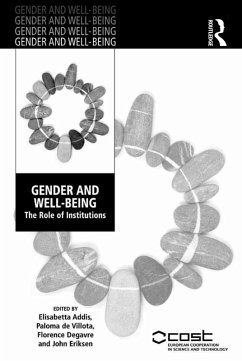Provisioning for basic human needs is done in three main kind of institutions: the familial household; the commercial enterprise selling goods and services; the institutions of the Welfare State that provide education, medical care and other goods and personal services to all or to some specific groups of citizens in need. The purpose of this book is to study the interplay of these institutions and their impact on well-being, and to analyze key policies and measures that have been implemented in European countries. Institutions determine labour demand (men and women are hired by the institutions of the Welfare State or by market providers of care), the possibilities of consumption (wages earned can be used to buy goods and services only if such goods and services are provided by the market) and allocate people's time, in particular women's time, between paid work and unpaid domestic production and provision of care, shaping both the gender relations and time use of people of both sexes. The proper balance of these institutions is a prerequisite of well-being both of the care givers and of the care receivers, and also for satisfactory gender relations. The chapters in this book focus on the following sub-topics: gender and welfare regimes; gender, well-being and the provision of care in the family and the household; and gender and well-being in the labour market. They emphasise the interdependence of social and labour market policies in the context of fundamental changes in both working patterns (the increase in female labour-force participation rates) and social needs (including population ageing) and demonstrate that we need a more integrated approach to welfare policy which takes account not only of basic welfare entitlements, but also the need for supportive forms of service provision and employment regulation.
Dieser Download kann aus rechtlichen Gründen nur mit Rechnungsadresse in A, B, BG, CY, CZ, D, DK, EW, E, FIN, F, GR, HR, H, IRL, I, LT, L, LR, M, NL, PL, P, R, S, SLO, SK ausgeliefert werden.









